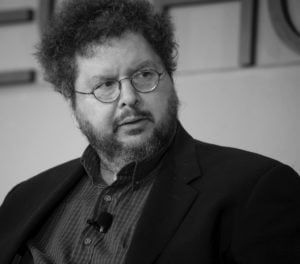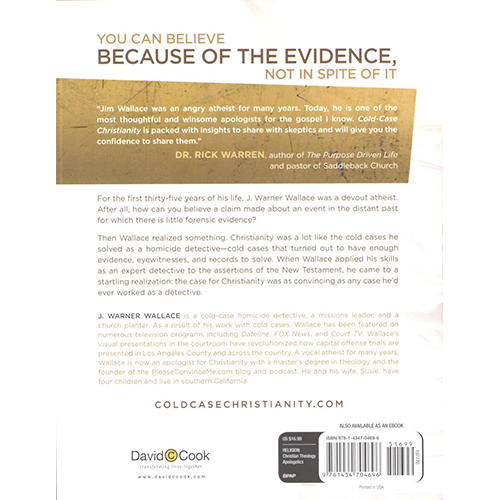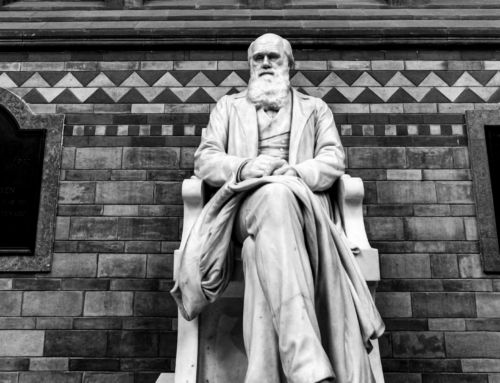Giving Up Darwin
“The origin of species is exactly what Darwin cannot explain.”
—David Gelernter, Professor of Computer Science at Yale University
I recently had the privilege of being a guest teacher at a Christian academy in the Chicago Suburbs. I was invited to spend three days teaching on Creation, Evolution, Genesis, and the science involved in this debate. During this time, several of the teachers told me that they recently heard news of a Yale professor declaring publicly that evolution was not true. I did a little digging and discovered this apostate former evolutionist.
“I grew up with Darwin’s theory, and had always believed it was true.”
—David Gelernter
His name is David Gelernter, and he is a professor of computer science at Yale University, chief scientist at Mirror Worlds Technologies, and a member of the National Council of the Arts. His article, published by the Claremont Institute, is partially a general review of the books by Intelligent Design proponents, and also an examination of the journey of ideas which took this man from faith in Darwin to intellectual doubt in the ability of evolution to explain the world in which we live. “Like so many others,” he says in this article, “I grew up with Darwin’s theory, and had always believed it was true.”
Professor Gelernter credits Darwin’s Doubt by Stephen Meyer for opening his eyes. “Darwin’s Doubt is one of the most important books in a generation,” he says in his article. “Few open-minded people will finish it with their faith in Darwin intact.” He summarizes the book this way: “Meyer doesn’t only demolish Darwin; he defends a replacement theory, intelligent design (I.D.).”
Professor Gelernter’s article is no brag piece about his own intelligence, nor even a joyful dismissing of a failed scientific model. And before the skeptics can level the accusation, this is not the result of some conversion to Christianity wherein he felt compelled by a new religious position to turn his back on the popular science of the day. Professor Gelernter describes Darwin’s theory of evolution as “a brilliant and beautiful scientific theory.” It is with seeming reluctance that he explains the great failings of his former faith. This is merely one more example of an educated man discovering that the Darwinian paradigm he had lived with all of his life simply does not stand up under scientific scrutiny, even when it saddens him to admit it.
“Darwinism is no longer just a scientific theory…but an emergency replacement religion for the many troubled souls who need one.”
—David Gelernter
Echoing what we in creation ministries understand all too well, Professor Gelernter says,
“Intelligent design as Meyer explains it, never uses religious arguments… The religion is all on the other side. Meyer and other proponents of I.D. are the dispassionate intellectuals making orderly scientific arguments. Some I.D.–Haters have shown themselves willing to use any argument—fair or not, true or not, ad hominem or not—to keep this dangerous idea locked in a box forever. They remind us of the extent to which Darwinism is no longer just a scientific theory but the basis of a worldview, and an emergency replacement religion for the many troubled souls who need one.”
This statement echoed a quote from Evolutionist Professor of Philosophy and Zoology, Michael Ruse, which I had shared with those academy students the day before I discovered this article. Professor Ruse had said, “I am an ardent evolutionist…Evolution is a religion. This was true of evolution in the beginning, and it is true of evolution still today.”
Many skeptics intending to attack biblical creation claim that the conflict over origins is one of religion vs science. What they often fail to understand is that they are right, but that the conflict is between science and the religion of Darwinism. Observational science studied with an open mind and intellectual honesty has never conflicted with the Bible, but rather has led many to abandon atheism and put their trust in the Word of God.
“The fossil record showed that Darwin’s theory was wrong.”
—David Gelernter

The article written by Professor Gelernter goes on to discuss some of the core failings of evolutionary dogma and the ways in which observational science shows that Darwin’s theory, beautiful or not, MUST fail. The fossil record is discussed as it relates to the predicted plethora of transitional forms that MUST have existed, if Darwinian evolution were truly a fact of history.
“But those predecessors of the Cambrian creatures,” says Professor Gelernter, “are missing. Darwin himself was disturbed by their absence from the fossil record. He believed they would turn up eventually. Some of his contemporaries (such as the eminent Harvard biologist Louis Agassiz) held that the fossil record was clear enough already, and showed that Darwin’s theory was wrong.”
“…the ever-expanding fossil archives don’t look good for Darwin, who made clear and concrete predictions that have (so far) been falsified—according to many reputable paleontologists, anyway.”
“Darwin’s main problem, however, is molecular biology.”
—David Gelernter
Once again echoing what I had explained to my students just the day before I discovered his article, Professor Gelernter takes aim at the heart of the Darwinian religion when he discusses the modern scientific field of genetics. He explains in detail the modern understanding of genes, their relationship to the construction of proteins, and the ways in which mutations affect the information contained in existing, functional genes. “If you tinker with a valid gene,” he explains, “you will almost certainly make it worse—to the point where its protein misfires and endangers (or kills) its organism—long before you start making it better.”

To explain why mutations are not capable of salvaging the Darwinian hypothesis, he gives us a mental experiment to show the collection of vast improbabilities that evolution has to overcome in order to move up the Darwinian tree of life and explain how worms can give rise to fish, and then fish to lizards. He explains how we can calculate the odds of random chance processes creating a functional protein which can be of benefit to the organism and contribute to this imagined evolutionary path.
Imagining we wish to create a chain of 150 amino acids that can be folded into a functional protein (a protein far smaller than the average protein in the human body), he demonstrates that “The total count of possible 150-link chains, where each link is chosen separately from 20 amino acids, 20150. … and there are only 1080 atoms in the universe.”

But despite the amazingly large possibilities for random outcomes, the odds of getting one that can function is amazingly small. Referencing the work of a scientist named Douglas Axe, Professor Gelernter explains that “of all 150-link amino acid sequences,1 in 1074 will be capable of folding into a stable protein. To say that your chances are 1 in 1074 is no different, in practice, from saying that they are zero. It’s not surprising that your chances of hitting a stable protein that performs some useful function, and might therefore play a part in evolution, are even smaller. Axe puts them at 1 in 1077.”
“Neo-Darwinian Evolution is—so far—a dead loss.”
—David Gelernter
“In other words: immense is so big, and tiny is so small, that neo-Darwinian evolution is—so far—a dead loss. Try to mutate your way from 150 links of gibberish to a working, useful protein and you are guaranteed to fail. Try it with ten mutations, a thousand, a million—you fail. The odds bury you. It can’t be done.”
Professor Gelernter is not professing a faith in the six day creation, 6,000 years ago as Genesis describes, and we don’t wish to overstate his position. His words merely illustrate the fact that scientists of every field and professors in every avenue of academic study have come to the same conclusion once they have been moved to consider Darwinian evolution with an open mind: Darwinian Evolution is “a dead loss.” It asks the impossible. It is a religion which demands countless miracles, while at the same time rejecting the existence of a miracle worker.
At the end of my last talk, a student asked me why, if evolution is so obviously false, do people still believe it? I replied that, most people simply don’t know the facts. Many fail to define “Evolution” so that it means what Darwin meant. Instead they come to think it is simply any change over time, thus making it not only easy to accept, but easy to find evidence for. Many, such as Professor Gelernter, do not take the time and effort to examine it until challenged to do so.

“You cannot add by subtracting.”
—David Gelernter
What I taught those students, and what Professor Gelernter discovered through the writings of Intelligent Design proponents is nothing the common person cannot comprehend. It boils down to ideas as simple as, “You cannot add by subtracting.” But the reason why many are capable of facing the facts and still embracing evolution comes down to an unwelcome conclusion. As I explained to the students, when you realize that evolution is impossible, then you have to ask where we came from. And when you realize that the natural processes cannot account for all life, then you must conclude that something above nature—something SUPERnatural must be the explanation. And when you understand the information in the cell, the fine tuning of the universe, and a host of other observable facts of science, you must conclude that we have a brilliant, intelligent, supernatural designer.
“I hope there is no God! I don’t want there to be a God…”
—Thomas Nagel, Professor of Philosophy and Law at New York University
But that means… God.
And that means WE cannot be our own gods, and make our own rules, and live as if there is no authority over us. And to some, this is a conclusion which is unacceptable, and they would prefer to embrace a lie than accept this truth.
Professor Richard Lewontin once admitted this when he said, “…we have a prior commitment, a commitment to materialism…Moreover, that materialism is absolute, for we cannot allow a Divine Foot in the door.”

Professor of Philosophy and Law at New York University, Thomas Nagel, once admitted, “I want atheism to be true and am made uneasy by the fact that some of the most intelligent and well-informed people I know are religious believers. It isn’t just that I don’t believe in God and, naturally, hope that I’m right in my belief. It’s that I hope there is no God! I don’t want there to be a God…” He went on to admit, “My guess is that this cosmic authority problem is not a rare condition and that it is responsible for much of the scientism and reductionism of our time. One of the tendencies it supports is the ludicrous overuse of evolutionary biology to explain everything about human life, including everything about the human mind…”
For those who are capable of considering these matters with an open mind, we are dedicated to assisting others to “Always be prepared to give an answer” (1 Peter 3:15). For those who are not, we pray that God would do a work in their hearts and their minds to receive the truth, that HE can set them free. This is why I spent three days teaching those students what Genesis says, and why they can trust it. This is why Creation Today produces content on these topics in articles, videos, podcasts and films. This is why we work to equip you, so that you will be prepared to give an answer.
We help people give up Darwin, so they can give themselves to Jesus.












